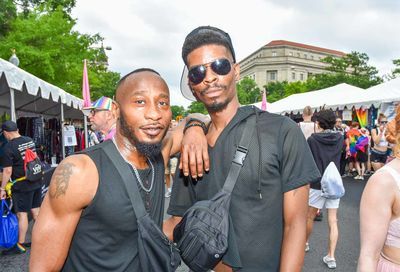4th Circuit to hear Virginia transgender student’s appeal
ACLU-led legal team to argue that Gloucester County restroom policy violates Title IX protections

The 4th U.S. Circuit Court of Appeals on Wednesday will hear the appeal of a Virginia transgender student who is challenging his school’s restroom policy requiring him to use private facilities or the facilities of his biological sex at birth. Although an opinion will likely not be issued until two to four months after Wednesday’s oral arguments, the case could set a precedent for how courts deal with discrimination against people based on their gender identity.
The student at the heart of the case, Gavin Grimm, is a transgender male who had previously been permitted to use the boys’ restroom for a period of months, without objection, after he notified administrators of his gender identity at the beginning of his sophomore year. But a group of “concerned” parents and community members, egged on by socially conservative and anti-LGBT interest groups, threatened to oust the members of the school board if they did not prohibit Grimm from using the boys’ restroom. In a 6-1 decision, the school board decided to require Grimm to either use a single-stall restroom or other “alternative private facility” separate from his peers, or the girls’ restroom.
In response to the board’s decision, the American Civil Liberties Union (ACLU) brought suit on behalf of Grimm, arguing that the Gloucester County restroom policy violates Title IX prohibitions on sex discrimination and equal protection under the Fourteenth Amendment to the U.S. Constitution. Grimm’s legal team also asked for an injunction that would allow him to use the boys’ restroom for the rest of his junior year. But U.S. District Judge Robert Doumar rejected the request for an injunction and threw out Grimm’s claims of discrimination under Title IX, prompting Grimm’s legal team to appeal his decision. Doumar has not yet ruled on the part of the lawsuit dealing with equal protection.
“This argument comes at a critical time for trans people,” Joshua Block, a senior staff attorney in the ACLU’s Lesbian, Gay, Bisexual and Transgender Project, said during a telephone conference call Monday evening. “While we continue to push for explicit protections in our federal civil rights statutes protecting against discrimination on the basis of gender identity, it’s now widely recognized by courts that discriminating against trans people already violates protections against sex discrimination in the Constitution and in Title IX. And of course, in order to equally participate in school, life and society, transgender people, like everyone else, have to use the restrooms.”
Block also noted in the conference call that this would be the first time that a federal appeals court will weigh in on whether Title IX’s prohibitions on sex discrimination apply to transgender individuals, meaning it will likely be a bellwether case that could affect future court rulings dealing with anti-transgender discrimination. The U.S. Department of Education and the U.S. Department of Justice have previously ruled that, under Title IX, schools must allow transgender students to use locker rooms, restrooms and changing facilities consistent with their gender identity.
The crux of the case will likely hinge on the interpretation of a Department of Education regulation that allows schools to provide separate restrooms for different genders. The Gloucester County School Board — as well as other school boards throughout the nation who have adopted similar policies but have not yet gone to court — argues that the regulation allows them to pass a policy requiring that students use either private facilities or facilities segregated on the basis of biological sex.
If the court adopts the Department of Education’s interpretation that Title IX applies to transgender students, then students like Grimm should be allowed to use the bathroom that corresponds to their correct gender identity. Such a decision would also preempt any anti-trans state laws, such as one proposed by Del. Mark Cole (R-Fredericksburg, Hartwood, Remington) that would fine students and administrators who allow students to use restrooms other than those designated for their biological sex at birth.
“I feel humiliated and dysphoric every time I’m forced to use a separate restroom facility just so I can carry out a basic function of human life,” Grimm said in the conference call. He has also had to struggle with negative messages from some people on social media, like Facebook, and particularly with adults who have spoken disparagingly about him, ridiculed him and made his anatomy a topic of public conversation. He called the experience both “terrifying” and “dehumanizing.”
Grimm also added that forcing him to use the girls’ restroom would likely not achieve the result that the school board and anti-LGBT conservatives desire.
“Even before I transitioned, I looked physically male for a long time before I came out,” Grimm said. “I was using the female restroom for a period of time when I appeared, by all accounts, as male. I would be told to get out of the girls’ room. They’d ask me to leave, or express discomfort, or even once, a girl walked in and walked back out thinking it was the boys’ room.
“Now that I’ve been on hormone replacement therapy for an extended time, my voice is lower. I have facial hair,” he continued. “There’s no part of me that’s congruent with being in a girls’ restroom, and I certainly would think that could cause some discomfort and confusion.”
Support Metro Weekly’s Journalism
These are challenging times for news organizations. And yet it’s crucial we stay active and provide vital resources and information to both our local readers and the world. So won’t you please take a moment and consider supporting Metro Weekly with a membership? For as little as $5 a month, you can help ensure Metro Weekly magazine and MetroWeekly.com remain free, viable resources as we provide the best, most diverse, culturally-resonant LGBTQ coverage in both the D.C. region and around the world. Memberships come with exclusive perks and discounts, your own personal digital delivery of each week’s magazine (and an archive), access to our Member's Lounge when it launches this fall, and exclusive members-only items like Metro Weekly Membership Mugs and Tote Bags! Check out all our membership levels here and please join us today!




























You must be logged in to post a comment.